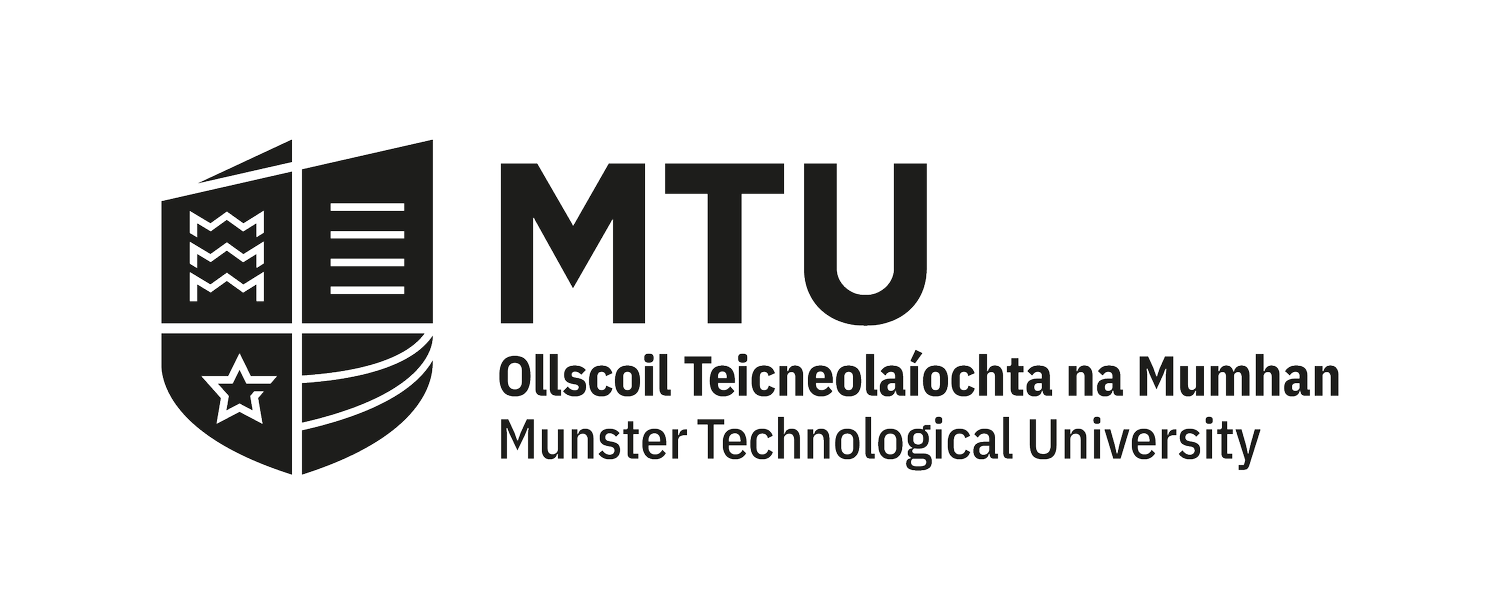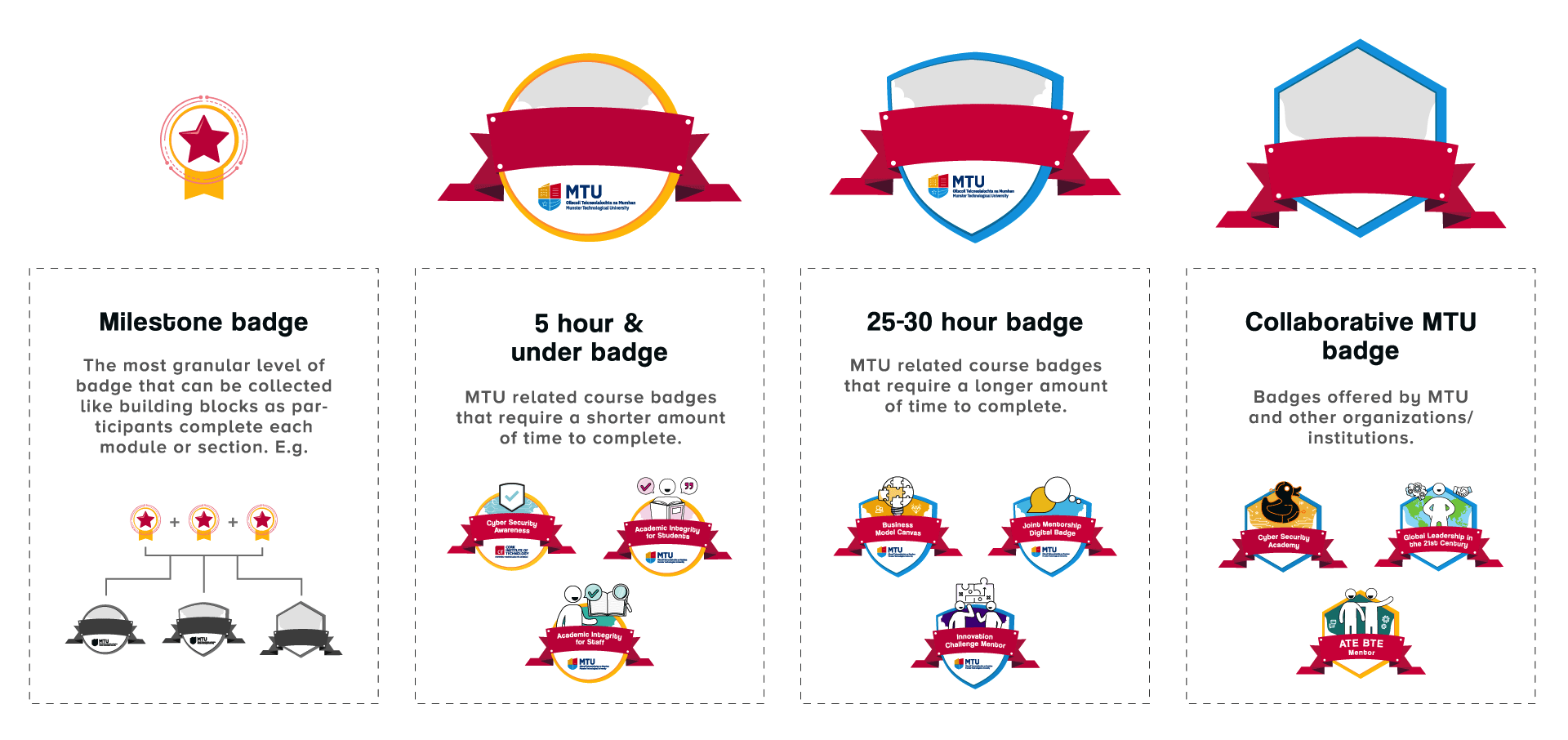Digital Badges
Digital Badges offer a concise, visual representation of skills, knowledge and achievements which can be displayed and shared through CVs or online profiles or portfolios. MTU staff work with the Dept of TEL (Cork campus) or EDSU (Kerry campus) to develop digital badges that can be offered to staff, students and external participants to recognise a range of CPD, co-curricular and extracurricular achievements.
Apply to create a MTU Digital Badge
For further information, please contact the TEL team at edtech@mtu.ie / EDSU at edsukerry@mtu.ie or apply below
Digital Badges offer a solution to an ongoing problem of trying to effectively and securely recognise all learning, to fill the gaps in terms of industry requirements and enable individuals to present all of their skills and knowledge achieved outside of the more traditional learning formats.
For students, they offer a more affordable means of building a skills profile for the workforce outside of a traditional classroom experience and provide opportunities to present themselves as more work-ready, "T-shaped" graduates, combining “vertical” knowledge through their primary degree with “horizontal” skills and knowledge through supplementary programmes and other co-curricular and extracurricular achievements.
MTU has developed and supported a number of Digital Badges across a range of Departments, Units and Initiatives. These non-credit-bearing badges can be provided to staff, students and other stakeholders on the basis of non-formal or informal learning and/ or activities achieved. Since initiating these badges,we have been developing a validated ecosystem and set of internal standards, based on best practices in the area, to ensure that the badges issued would be quality assured. Once a learner has met the pre-approved criteria and has achieved the learning outcome, the badges will stand as a valid indicator of their skills or competencies.
MTU digital badges conform to the Open Badges technical standards and each badge contains information about the criteria for achievement, the badge earner, the issuer, etc. They can be used to recognise many different forms of life-long learning (whether formal, non-formal or informal) and can be easily shared online through social media, e-portfolios or LinkedIn. MTU digital badges correspond to 25 hours of learner effort but the MTU badge ecosystem also includes badges in recognition of shorter courses and achievements.
MTU digital badges are aligned to the university’s strategic objectives, to invest in the continuing professional development and progression of our people; to cultivate a 'global graduate' mindset with valuable life and employment skills by internationalising the student journey; to design exciting, varied and interesting co-curricular and extracurricular experiences for the learner, fostering engagement, encouraging initiative, empowerment, and self development; and to provide a digital learning experience to increase flexibility, create new learning opportunities and enrich the learning experience of all students.
Staff can submit a request to create a digital badge at any time using the badge request form. This form gathers information such as the target audience, the criteria, the skills and values represented by the badge, required evidence for earning the badge and any external endorsements of the badge.
A member of TEL or EDSU will be in touch to discuss your requirements and provide feedback. You will have an opportunity to re-submit the form if you would like to make changes based on this feedback.
Once approved, we will create your digital badge. If you would like to issue the badge through your Canvas module, TEL (Cork campus) or EDSU (Kerry campus) will configure the module to allow for the streamlined delivery of the badges and will provide guidance on how you can monitor and manage the badge awards.
Digital badges can be used by staff and students to showcase their accomplishments and achievements from formal, non formal and informal learning experiences. Some examples are outlined below:
- The use of digital badges as a means of supporting T-shaped/ more work ready/ more employable graduates
- Students who undertake digital badges in addition to their formal study are able to broaden their graduate profile in terms of knowledge skills and competencies. This has an immediate effect of making MTU students who are able to list additional Digital Badges on their CV or profile more attractive to employers.
- As a means of recognising additional activities, experience, skills, knowledge and competence
- Digital badges can be used to recognise and award elements “outside” of the credit system such as students’ soft skills, interests, social/community engagement (and other extracurricular activities) and supplementary academic work. This can help make MTU students who are able to list additional Digital Badges on their CV or profile more attractive to employers.
- As a means for MTU to create and reward bespoke training offerings - which may not be subject to or appropriate for official awarding of ECTS credits - to Industry.
- This can help facilitate MTU in achieving goals relating to local/regional/national development through engagement with enterprises, communities and individuals to accredit formal and informal learning.
- As a means of supporting adult learners in returning to HE via a gradual training process and the potentially the use of RPL to align Digital Badges with specific accredited modules.
- As a means of visually representing a traditional compliance or safety certification, enabling earners to easily demonstrate their skills on a CV or profile.
- These badges would generally be time-specific and include an expiration date after which reskilling is required, e.g. manual handling, first aid, etc.
MTU Digital Badge Examples
MTU digital badges are used to demonstrate a range of achievements and a badge ecosystem was developed to reflect the different ways that MTU staff and students can earn their badges. Each badge is designed based on the categories and structure of this ecosystem. Standard digital badges typically require 25-30 hours of earner effort and will follow a similar design. However, MTU does offer digital badges for short online courses or workshops and for initiatives developed in collaboration with other organisations or institutes.
How Digital Open Badges are issued
The Mozilla Foundation developed an open technical standard for the creation, issuing and validation of digital badges to ensure that they can be widely shared as a valid, verified recognition of achievement. This open technical standard involves the use of metadata to accompany the badge image, containing information like:
Badge description/ purpose of the badge
Criteria/ learning outcomes to be met in order to earn the badge
Who the badge was issued to (name and email address)
Who the badge was issued by
The date the badge was issued
An expiry date (if applicable)
This information will be gathered through the application form. If you need help writing any of the above, please contact TEL (edtech@mtu.ie) or EDSU (edsukerry@mtu.ie).
The digital badge will be issued to earners when they have successfully completed the criteria outlined in the badge description. Providing evidence of this may be through a written reflection, assessment or other resource that can be used to demonstrate that the learning outcomes have been met. This evidence does not have to be through a formal exam but it is important to be able to retain a verifiable record of completion.
Accepting a Digital Badge
On successful completion of the digital badge requirements, a badge may be automatically or manually issued to earners. The badge earner will receive an email to notify them that they have been awarded a digital badge and will include instructions on how to access their digital badge. If the badge is issued through Canvas, the badge may be visible to the earner within the Canvas module. This will depend on the settings for the particular Canvas module. Earners can log into their badge profile on the MTU badge platform to retrieve their digital badge, to change the visibility of the badge and to share the badge on their social media, LinkedIn profiles or e-Portfolios.
Sharing Digital Open Badges
A key aspect of digital badges is that they are easily shared across various platforms and are globally recognised representations of achievements and accomplishments due to the use of the open technical standard.
The MTU badging platform allows earners to easily store and retrieve their digital badges, and offers quick ways of sharing the badges on social media, LinkedIn or an ePortfolio. Earners have control over which of their badges they would like to share and can choose to highlight the ones that are most relevant to demonstrate their achievements.





